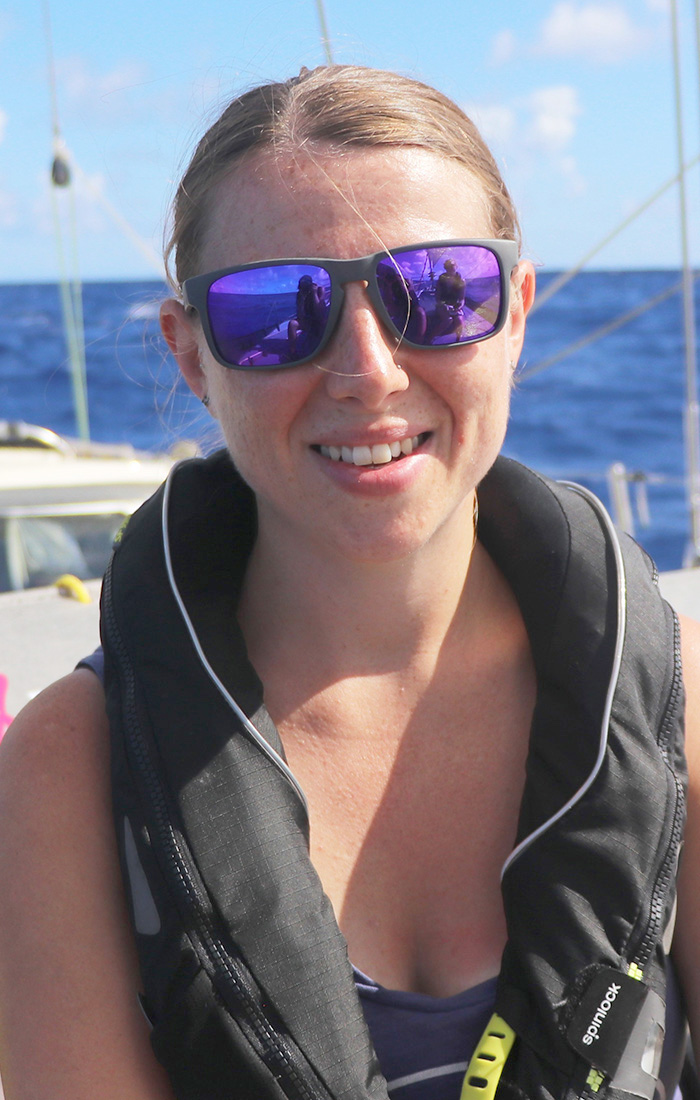Dr Winnie Courtene-Jones
Lecturer
Overview
Winnie is an marine biologist and plastic pollution expert whose research focuses on understanding the ecological impacts of anthropogenic stressors. In particular her research interests encompass the environmental prevalence, fate and impacts of (micro)plastics on organisms and ecosystem functions, to assess environmental risk and supporting effective interventions.
Since completing her PhD (SAMS, 2019), where she researched the current and historic presence of microplastic pollution in the deep sea ecosystem, Winnie spent 5 years working within the International Marine Litter Research Unit, at the University of Plymouth.
Her research has led her to study plastic pollution in a variety of terrestrial and marine environments, from agricultural soils and coastline to some of the most remote parts of our planet including the deep sea and oceanic gyres.
She has extensive experience conducting research at sea and in remote locations (e.g. Belize, Tanzania, and she has sailed the North Atlantic and South Pacific Ocean). As 'eXXpedition Round the World science lead' she led research examining the global land-sea flows and movement of plastic pollution and worked with >240 women citizen scientists from 40 nationalities. As part of the NERC-funded “Bio-Plastic-Risk” project, she has focussed on the environmental degradation and impacts of biodegradable and bio-based plastics (often termed as ‘bioplastics’ or ‘alternative plastics’).
Winnie is a passionate science communicator and authority on (micro)plastic pollution; she has spoken at the UN Global Plastics Treaty negotiations in Canada, and the British and European Parliaments. She is an active member of the Scientist Coalition for an Effective Plastics Treaty, (co-leading working groups on 'Microplastics', and 'Alternative & substitute Plastics') which supports progress towards the development of a legally binding instrument to address plastic pollution. She attended the 3rd and 4th Intergovernmental Negotiating Committee sessions.
Research areas and keywords
Keywords
- GE Environmental Sciences - plastic pollution, Stress Ecology, Ecotoxicology
- QL Zoology - Marine Biology, Marine pollution, Microplastic Pollution
Education / academic qualifications
- PhD , Microplastics in the deep-sea ecosystem: A study from the Rockall Trough, North East Atlantic Ocean (2015 - 2019)
- MSc , MRes Marine Biology (2012 - 2013)
- BSc , Zoology and Animal Behaviour , Bangor University (2008 - 2011)
Research outputs (23)
- Published
Plastics matter in the food system
Research output: Contribution to journal › Article › peer-review
- Published
Are Biobased Microfibers Less Harmful than Conventional Plastic Microfibers: Evidence from Earthworms
Research output: Contribution to journal › Article › peer-review
Effect of biodegradable and conventional microplastic exposure in combination with seawater inundation on the coastal terrestrial plant Plantago coronopus
Research output: Contribution to journal › Article › peer-review
Prof. activities and awards (12)
Insights Wales public talk: Microplastic pollution and solutions
Activity: Other › Types of Public engagement and outreach - Public lecture/debate/seminar
PhD examiner
Activity: Examination
Invited webinar "Microplastic Pollution and Solutions"
Activity: Other › Types of Public engagement and outreach - Public lecture/debate/seminar
Media coverage (4)
BBC Wales Breakfast: Environmental Pollution from North Sea Ship Collision
Press/Media: Expert Comment
BBC Radio Wales interview, Christmas Waste
Press/Media: Expert Comment


